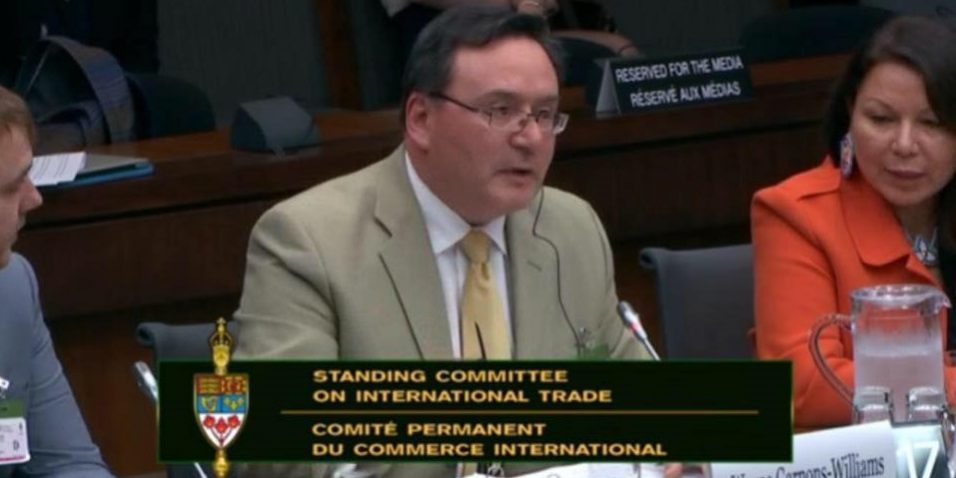Trump Improperly Exercising Executive Authority in Imposing Tariffs Against Canada
By Wayne Garnons-Williams, B.A.. LL.B. M.P.A. LL.M.
President Trump lacks the factual evidence required to exercise his executive powers to impose tariffs against Canada.
The Constitution of the United States, under the Trade and Commerce Powers clause, empowers Congress to regulate trade and commerce with foreign nations and with Indian tribes. However, there are various pieces of legislation that have been delegated by Congress to the President and this article will list these delegated authorities.
A key aspect of US Constitutional democracy is the series of checks and balances among the executive, legislative and judicial branches of government. Intrinsic to checks and balances between the legislative and executive branches of government is the power of Congress to delegate legislative powers to the executive (the President). Such delegated powers are not absolute and are subject to review and censure by Congress for the greater good of the Union.
The President of the United States, in exercising this delegated authority, holds significant executive discretion to impose tariffs. However, this authority can only be legitimately exercised in accordance with the conditions set out in the enabling legislation.
This delegated authority from Congress to the President has been put in place to allow the President to swiftly parry fast-moving threats to national security, to address unfair trade practices imposed by foreign nations, and to take swift unilateral action in specific trade-related emergencies. This authority was established to prevent an urgent and quickly evolving matter from becoming bogged down in congressional debate prior to any action being taken by the United States. In an age of rapidly changing global economic conditions this delegation of authority from Congress to the President provides swift, flexible power to maneuver the complexities of international trade disputes.
On February 1, 2025 the President of the United states exercised his delegated statutory authority under the section 203 of the International Emergency Economic Powers Act via Presidential Authorities Act 50 USC 1702 (1)(b) to issue 25% Tariffs against Canada.
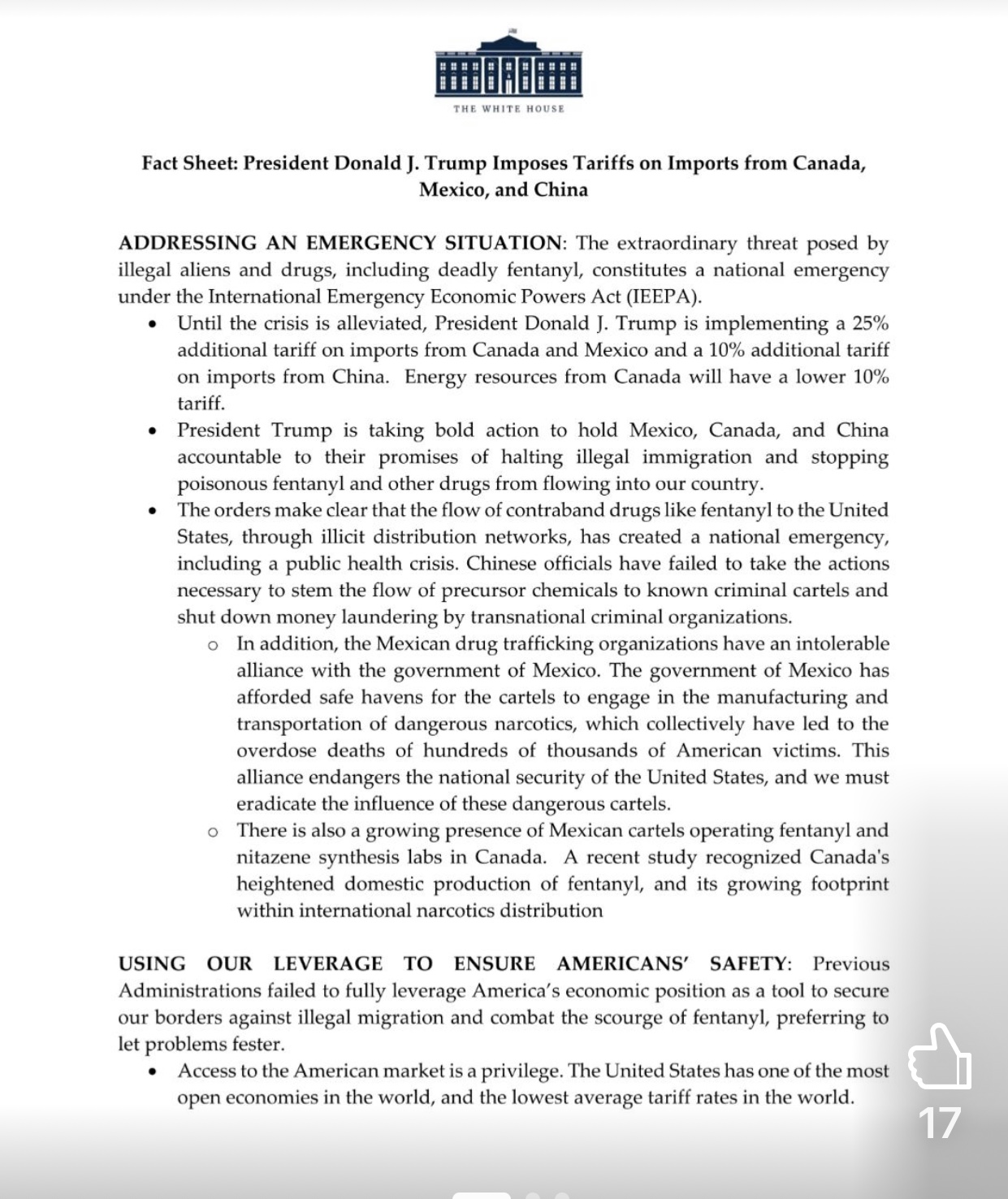
Screenshot
Delegated Authority of the President to impose Tariffs
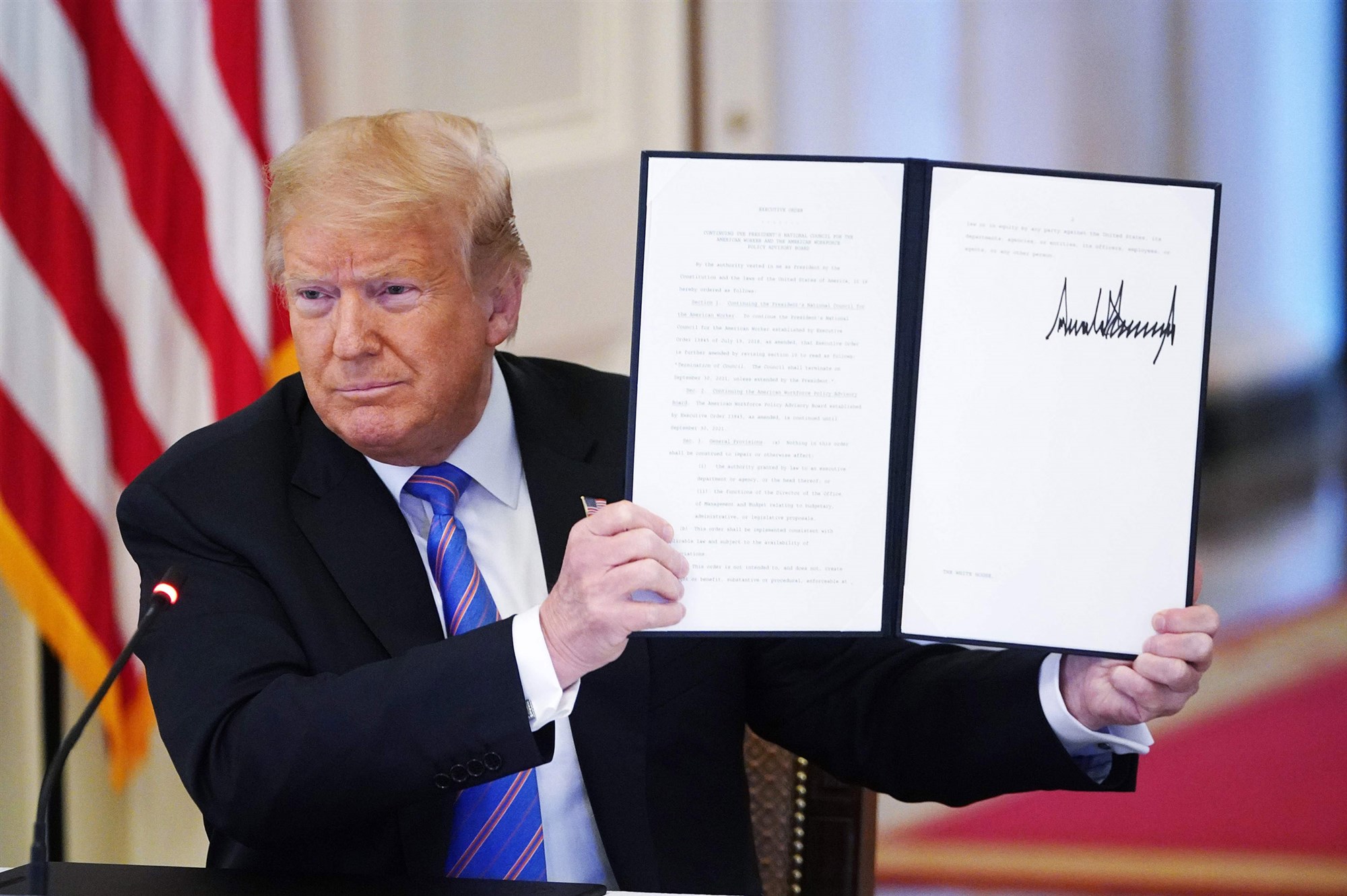
International Emergency Economic Powers Act (P.L. 118-50, Enacted April 24, 2024) s. 203
This section grants the President the authority to regulate trade during times of national emergency. Note that this section can take effect immediately upon the President declaring a national emergency. No later than 60 days after the enactment, the President shall issue regulations or other guidance as may be necessary for the implementation of the section. It is the authority under this Act that the President is currently wielding as executive power to impose 25% trade tariffs against Canada.
International Emergency Economic Powers Act (P.L. 118-50, Enacted April 24, 2024) s. 204
Oversight of the exercise of this delegated Presidential power is in the hands of Congress. Section 204(b) requires that the President “immediately” submit a Report to Congress that justifies the use of the power of section 203, specifying:
(1) the circumstances which necessitate such exercise of authority;
(2) why the President believes those circumstances constitute an unusual and extraordinary threat, which has its source in whole or substantial part outside the United States, to the national security, foreign policy, or economy of the United States;
(3) the authorities to be exercised and the actions to be taken in the exercise of those authorities to deal with those circumstances;
(4) why the President believes such actions are necessary to deal with those circumstances; and
(5) any foreign countries with respect to which such actions are to be taken and why such actions are to be taken with respect to those countries.
Section 204(c) compels the President to “report to Congress” within six months of his use of Section 203 powers to allow Congress to question and review the actions of the President under section 203. During the President’s mandatory appearance before it, Congress can question the President on his 204(b) Report to Congress:
At least once during each succeeding six-month period after transmitting a report pursuant to subsection (b) with respect to an exercise of authorities under this title, the President shall report to the Congress with respect to the actions taken, since the last such report, in the exercise of such authorities, and with respect to any changes which have occurred concerning any information previously furnished pursuant to paragraphs (1) through (5) of subsection (b)
From a reading of the White House Press statement issued February 1, 2025 entitled “Addressing an Emergency Situation,” the Trump administration is imposing 25% tariffs on Canada, improperly grouping Canada with Mexico on the importation into the US of illegal drugs such a fentanyl.
The claim that there is a need for presidential exercise of emergency powers against Canada does not stand up to factual scrutiny. Last year, U.S. Customs and Border Protection agents intercepted about 19 kilograms of fentanyl at the northern border, compared with almost 9,600 kilograms at the border with Mexico. The quantities of fentanyl leaving Canada for the United States are minuscule — 0.2 percent of what is seized at the U.S. southern border. (New York Times “Trump Calls Canada a Big Player in the Fentanyl Trade. Is It?” by Vjosa Isai, January 30, 2025)
https://www.nytimes.com/2025/01/30/world/canada/canada-fentanyl-trump.html
Out of all the illegal drugs crossing US borders into the United States, then, it is a fact that less than one per cent (1%) comes through Canada.
Congress is not powerless in this situation. Congress empowers the President under the International Emergency Powers Act Section 203. Congress also holds the President to account under the check and balance of Section 204 of that same legislation. It will be the duty of Congress to review the President’s Section 203 actions. When the 204(c) Presidential Report to Congress is duly submitted, Congress can and must hold the executive office to account for the factually void allegations used to improperly justify imposition of 25% tariffs against Canada in an act of clear executive overreach.
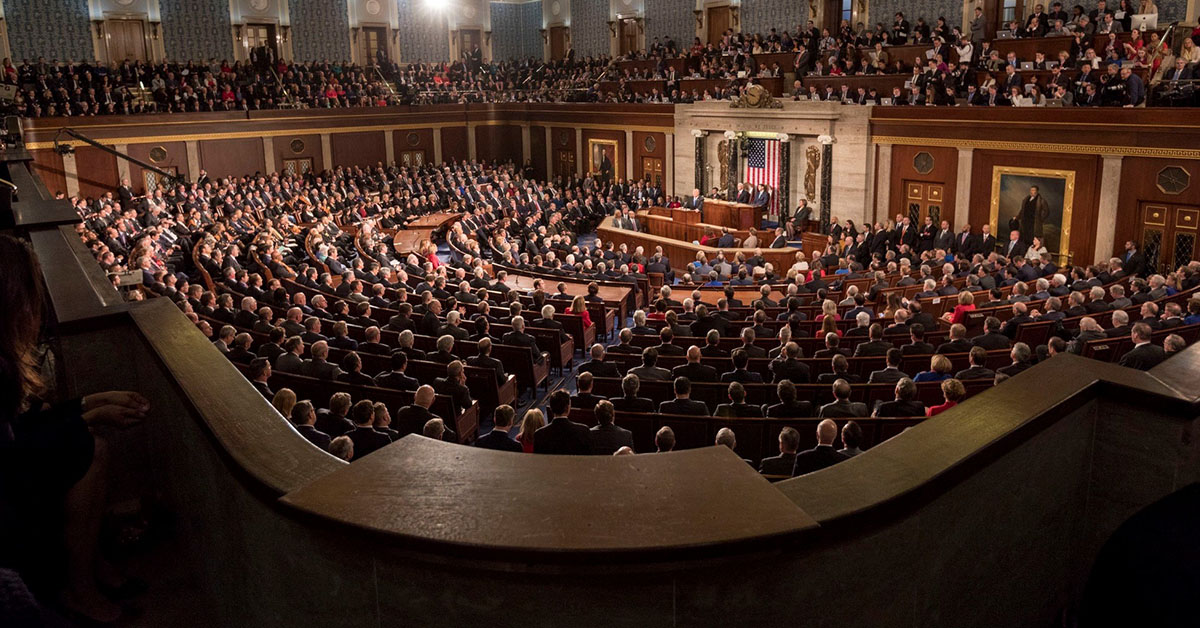
Other Executive Powers over Trade and Commerce of the President of the United States
Trade Act of 1974 (19 USC §2411) s. 122
This Act’s section 122 allows tariffs to be placed on imports up to a maximum of 15% if there is determined to be large trade imbalance against the US, or if the US dollar is significantly depreciating. This is an authority that has not yet been exercised by the President. If this power were to be exercised, the Presidential authority deriving from it would last for 150 days, after which it could only be extended by Congress.
Trade Act of 1974 (19 USC §2411) s. 201
Section 201 (commonly referred to as the “escape clause”) allows the President to impose temporary duties and other trade measures if recommended by the United States International Trade Commission (USITC). Like many of its trade remedy counterparts, the section 201 “escape clause” was crafted with the intent to provide swift temporary protection to domestic commerce. Section 201 allows for temporary relief of economic injury from imports by allowing industries more time to adapt to the domestic impact of the imports. Section 201 executive powers, as with those afforded by s.122, are temporary: they must eventually be reviewed and approved by Congress.
Trade Act of 1974 (19 USC §2411) s. 301
Section 301 allows the President to impose tariffs if a country’s trade practices are deemed unfair or if the foreign country’s trade policies hinder US Commerce. Many US importing companies resent the use of Section 301, noting that their industries have suffered from costs that cannot be passed on to consumers. In fact, the Section 301 tariffs are not paid by foreign governments, manufacturers, or exporters, because US law requires that these tariffs be paid by the US importers. Section 301 actions typically take effect within 30 days of the final determination of the United States Trade Representative (USTR) to take retaliatory action, although investigations and fact finding can take up to 12 months to complete.
Trade and Expansion Act of 1962 (19 U.S.C. ch.7) s.232
Section 232 grants the President the authority to impose tariffs on imports if they are deemed to threaten national security. A factual confirmation from the allegation of “threat to national security” may require up to 270 days, during which a report is prepared by the Secretary of Commerce for review and execution by the President. It is to be noted that this clause was used by President Trump in 2018 to impose tariffs on steel a
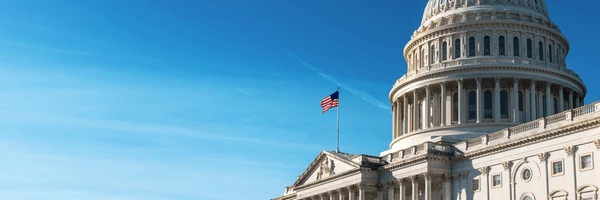
About the Author: Wayne Garnons-Williams is the Chair of the International Intertribal Trade and Investment Organization. Further, he leads an international business entitled Indigenous Sovereign Trade Consultancy Ltd. and is the founding President of the International Inter-tribal Trade and Investment Organization; a 501 (c)(3) educational charity incorporated in Oklahoma with international representation from Australia, New Zealand, Taiwan and Canada.
Wayne’s Master of Laws research thesis out of the University of Oklahoma College of Law was an exploration of the legal history, law and policy of Indigenous trade between Canada and the United States.
Wayne is one of the founding members of the Global Affairs Working Group on Indigenous International Trade. Wayne was instrumental in advising on the development of Indigenous trade policy for New Zealand and Canada as well as being appointed lead Indigenous negotiator for the Indigenous Peoples Economic Trade and Cooperation Arrangement (IPETCA).
He is also a Research Fellow specializing in International Comparative Indigenous law at the University of Oklahoma, College of Law as well as a Senior Legal Fellow for the Centre for International Sustainable Development Law. He was appointed by Order in Council as a member to the NAFTA Chapter 19 Trade Remedies roster and then appointed in 2020 as a CUSMA Advisory Committee Member on Private Commercial Disputes, Article 31.22.
He co-authored a textbook entitled Indigenous Peoples Inspiring Sustainable Development, to be published by Cambridge University Press in July 2025 on International Indigenous Trade & Environmental law and is teaching a course based on his textbook as part of the Bachelor of Indigenous Entrepreneurialism Program at United College, University of Waterloo.
Wayne is currently the CEO of the not-for-profit registered charity, the National Sixties Scoop Healing Foundation.

